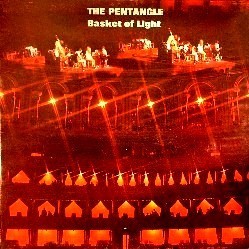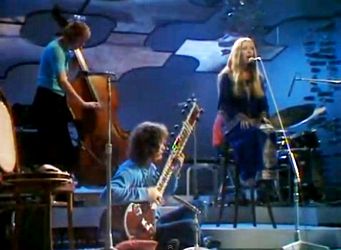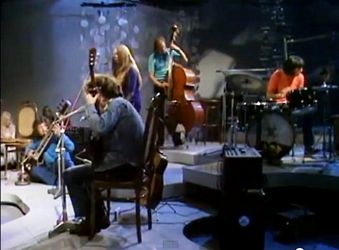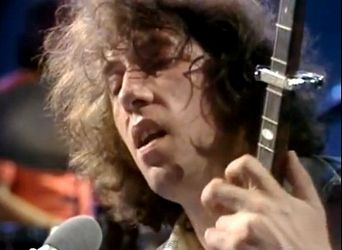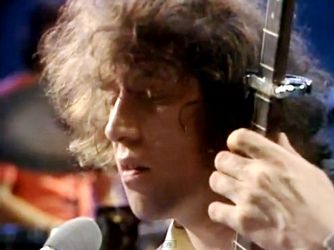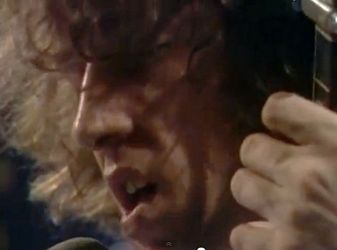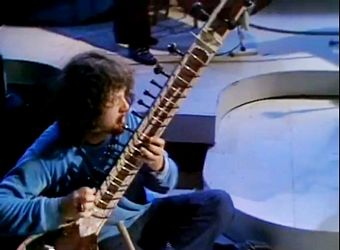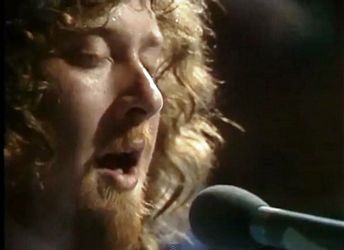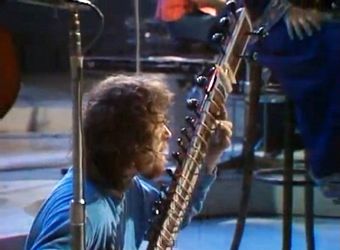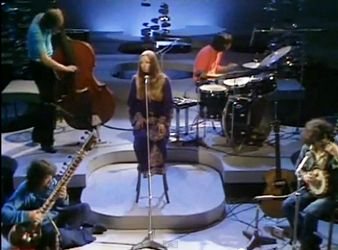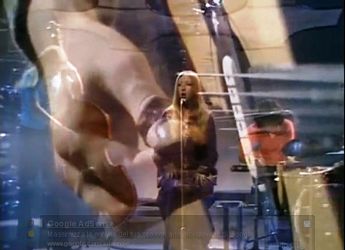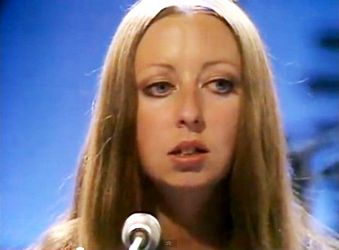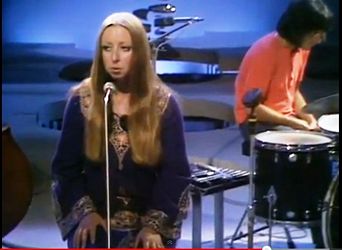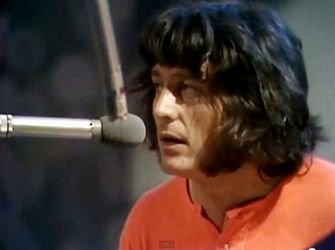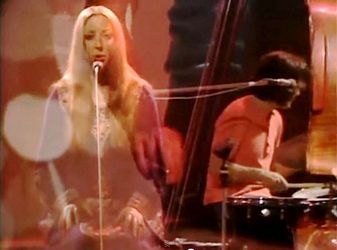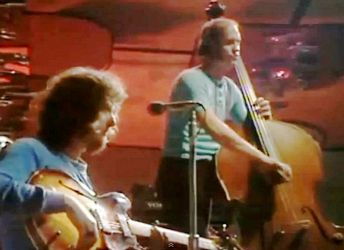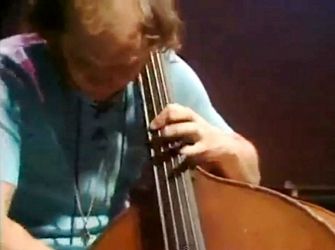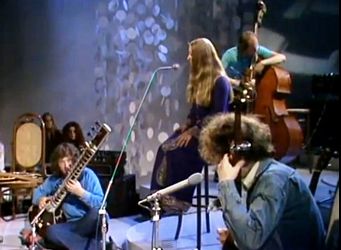|
Lyke significa "corpse" ovvero "corpo", "wake" significa
"watch" ovvero "veglia" e "dirge" significa "canto funebre". E di questo
si tratta, di un antico canto funebre dell'Alto medioevo, intonato
vicino al corpo del trapassato, nel breve periodo in cui si credeva (e
si crede tuttora) che l'anima sia ancora vicina al corpo, prima di
intraprendere il suo ultimo viaggio.
E il viaggio è il tema delle strofe successive, l'anima dovrà
attraversare una brughiera irta di spine (winny-muir che in inglese
moderno è tradotta come thorny moor) e deve attraversare il ponte del
Purgatorio, secondo la tradizione dell'Europa del Nord, il Brig O Dread
ovvero Bridge Of Dread, il ponte traballante, o il ponte della paura,
dove un passo falso può far precipitare per sempre l'anima nelle fiamme
dell'Inferno. Per attraversare sicuri la brughiera servono buone scarpe
("shoon") e "hose", ovvero soprascarpe o calzari (traduciamo con
"stivali"), ma per averle ai piedi quando servono bisogna essere stati
generosi in vita, averle offerte ai viandanti o ai bisognosi quando ne
avevano necessità. Così come per superare il Ponte del Tremore bisogna
aver donato acqua e cibo agli assetati e agli affamati, non bastava aver
donato oro ed argento.
Un'ultima parola su cui si è discusso molto è "fleet" (che i Pentangle
pronunciano in realtà "sleet"). Potrebbe significare "pioggia gelata" o
"nevischio" (sleet) ma è più probabile che si riferisca alla stanza
principale della casa medievale, quella a piano terra con la cucina e il
grande camino nella quale si riunisce nelle lunghe sere d'inverno la
grande famiglia patriarcale, la cucina del Castello di Fratta di
Ippolito Nievo, per intendersi. Le lettere "f" ed "s" erano
intercambiabili nell'inglese antico strettamene imparentato con il
celtico e probabilmente è così. Il calore e il conforto della casa, a
lume di candela, è dove il canto si augura sia stata spesa bene la vita. |
|
La canzone si riallaccia probabilmente alla leggenda del
corno miracoloso, preparato dalla fata Morgana, la sorellastra di Re Artù.
Il corno era in grado di rilevare se una donna aveva commesso adulterio,
perché bevendo da esso una adultera non poteva non far cadere il vino. La
fata Morgana aveva spedito il corno a Camelot per mezzo di uno dei suoi
cavalieri, per smascherare la regina Ginevra, che aveva come noto una
relazione con il cavaliere della Tavola rotonda Lancillotto. Ma durante il
viaggio il corno è stato sottratto da Sir Lamarok, uno dei cavalieri di
Re Marco, e da esso bevvero sua moglie, la regina Isotta (che aveva come
noto una relazione con Tristano) e dalle altre dame di corte (ben poche
delle quali superarono la prova).
Come si può leggere nella traduzione, anche in questo caso, come in
tutte le storie medievali di corte che si rispettino, il signore torna
dalla guerra coperto di onori, ma la sua dama che trepidante lo ha
salutato 1000 giorni prima temendo per la sua vita, non ha resistito
sino alla fine alle tentazioni. |
The song
goes back probably to the legend of the miraculous horn, prepared by the
fairy Morgana, the sister of King Arthur. The horn was able to detect
whether a woman had committed adultery, because drinking it an adulteress
could not drop the wine. The fairy Morgana had sent the horn to Camelot by
one of his knights, to expose the Queen Guinevere, who was known as a
relationship with the knight of the Round Table Lancelot. During the voyage,
the horn was subtracted from Sir Lamarok, one of the knights of King Mark,
and it drank his wife, Queen Isolde (who was known as a relationship with
Tristan) and the other ladies of the court (very few of which passed the
test). |
|
"Sally Go Round the Roses" è il più
grande successo del gruppo femminile nero del Bronx delle Jaynetts,
avendo raggiunto il n.2 in USA nel 1963.
Le Jaynetts erano un gruppo essenzialmente di studio nel quale si
avvicendavano più coriste, le principali erano Johnnie Louise Richardson,
Ethel Davis, Mary Sue Wells, Yvonne Bushnell, e Ada Ray, ma si
presentavano normalmente come un trio. Erano prodotte da Zell (Zelma)
Sanders, madre di una delle Jaynetts (Johnnie Louise Richardson),
proprietaria di una etichetta discografica e co-autrice di questo brano
assieme al produttore di un'altra etichetta, Abner Spector, con il quale
si accordò per il lancio del nuovo gruppo.
A Spector si deve l'attento lavoro di studio (con sovraincisioni e
sperimentazioni) all'origine del sound particolare che contribuì al
successo del brano.
Le parole si prestavano a più interpretazioni, e la
loro ambiguità ha anch'essa contribuito al successo a lungo avuto dal
pezzo. Si è detto in particolare che:
1) Spiegazione semplice: la canzone parla di una donna,
Sally, che vede il suo uomo amare un'altra donna in un letto di
rose; la cantante (donna anch'essa) si riferisce a Sally in terza
persona e le rose sono sia un simbolo di amore sia di dolore per la
perdita dell'amato nonché probabilmente della verginità (il segreto
associato alle rose "che non possono raccontare il loro segreto")
2) spiegazione più raffinata: da alcuni elementi, l'uso
ambiguo della parola baby, il fatto che sembri una canzone dedicata da una
donna ad un'altra donna, la citazione dei "tuoi segreti" che le
rose non racconteranno mai, hanno da sempre associato il brano all'amore
lesbico, ovviamente trattato in modo "criptico" e nascosto (siamo
agli inizi degli anni '60).
Si è anche detto che il tema musicale sia derivato da
un traditional inglese, effettivamente la versione dei Pentangle sembra
avvalorare questa ipotesi, vista la omogeneità con gli altri brani folk
del gruppo inglese.
Da notare che di questa canzone era già stata fatta una
versione "psichedelica" da Grace Slick
nel 1966 con "The Great Society"
(il suo gruppo prima di raggiungere come cantante e front-woman i Jefferson
Airplane) e, in seguito (nel 1973) sarebbe stata ripresa dal
cantautore e vocalist Tim Buckley nel
suo album "Sefronia".
|
The Jaynetts,
from The Bronx, NY, recorded one of the more discussed recordings of all
time, the
mystical-sounding "Sally Go Round the Roses," which shot to
number two on the pop charts in 1963 in USA.
The Jaynetts were a female R&B group from the Bronx. Formed by
producer/composer J & S Records label owner Zelma "Zell"
Sanders, the Jaynetts were really more a studio concoction than a group.
In fact, the three women in the usual Jaynetts publicity photo may not
even be the Jaynetts that recorded the song. There were at least five
female vocalists on the date the song was recorded-- Johnnie Louise
Richardson, Ethel Davis, Mary SueWells, Yvonne Bushnell, and Ada Ray.
Sally, Go 'Round The Roses was a number two song for the Jaynetts in
1963. Zell had this odd little number, "Sally, Go 'Round the
Roses," when Tuff Record's producer-label executive Abner Spector
came to town looking for some material; and a girl group. The meeting of
Spector, the Jaynetts, and the mystifying lyrical ambiguity of Zell's
"Sally" would culminate in the creation of a rock and roll
classic.
Johnnie Richardson recalled to one rock historian, "What happened
was that Abner Spector was an electronics nut. He took the girls in the
studio on a Friday, and they didn't get out of there until everybody was
on the track. Anybody that came in the studio that week, he would put them
on. Originally, I think he had about 20 voices on 'Sally.'" The cost
of the project alone, Richardson figured was over $60,000 - an unheard of
amount of money to spend on recording a pop single in 1961.
Zelma "Zell" Sanders was the mother of Johnnie Louise
Richardson who was a touring member of the Jaynetts after she had been
part of the singing duo of Johnnie & Joe. Johnnie suffered a stroke
and died on 10-25-88.
Sally, Go 'Round The Roses was reprised by
Grace Slick & the Great Society just prior to her joining the
Jefferson Airplane.What about the songs cryptic interpretation?
"Sally, Go Round the Roses" is a timeless wonder of a song
featuring an odd hypnotic rhythm and soft voices seductively rising and
falling. The lyrics seem to portray Sally in an alluring bed of roses,
catching an eyeful of her lover with another.
Another interpretation of this song is Sally a "closeted"
lesbian who sees her "baby" also female with "another
girl" which is the "saddest thing in the whole wide world"
except perhaps being a lesbian in 1963. The roses "won't tell her
secret" Of course her "secret" is her homosexuality and she
has no one to confess it to, but the roses where she "can sit and
cry, not a soul will know."
"Sally Go Round the Roses" very poignantly describes the way
lesbians must have felt back in the early 60's when must of them felt that
they had to hide their sexual orientation.
Another interoperation is the following. "Baby" to refer to a
guy was typical of lots of girl-group recordings (e.g. "Be My
Baby"). Sally had just lost her virginity to the guy and now he's
with another girl.
Others think the song is about a religious experience, or possibly a
mental breakdown.
It has been said "Sally, Go Round the Roses" was derived from
English folk music. Others say it it was Black jump rope or Jacks playing
rhyme.
(Information on this page taken from a discussion from
rec.music.rock-pop-r+b.1960s) |
